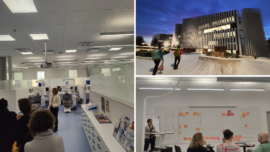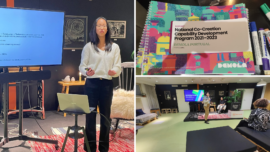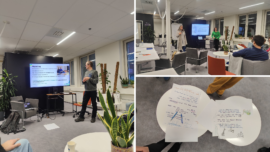In December 2024 the project members of NEST met up in Finland to bring the various ecosystems together and learn from each other. Lisa Zhang, a Master Healthy Ageing Professional student from the Hanze University of Applied Sciences and action researcher of the SIEHL* Eemsdelta, shares her experiences.
*SIEHL – Social Innovation Ecosystems in Healthy Living
Day 1 – SIEHL – Metropolia HyMy Village (Wellbeing and health village)
“Our journey began at HyMy Village at Metropolia University of Applied Sciences, a thriving learning environment in Finland focused on wellbeing and health services. Metropolia has created a unique learning and development environment with HyMy Village. This initiative, based on an ecosystem approach, brings together stakeholders (e.g., students, citizens, professionals) and various disciplines to innovate in the field of well-being and healthcare.
We were then given a guided tour, showcasing the physical spaces that comprise Hymy Village. From comfortable rooms designed for safe client conversations to state-of-the-art facilities like optician spaces in schools, dental spaces (20 in total), sports testing centers, and physiotherapy rooms. It was impressive to see.
After learning more about HyMy Village, we participated in a timeline session to better understand the setup and needs of the SIEHL initiative. HyMy Village worked on filling in their timeline, while other SIEHLs created timelines for their respective initiatives. Following this, we formed four mixed groups to analyze HyMy Village’s timeline and engage in meaningful dialogue. The discussions were inspiring, leading to valuable insights and perspectives.
Next on the agenda was a fishbowl session which involves a group of six people sitting in a circle at the center, while the rest sit outside the circle, attentively listening. The fishbowl sessions led to meaningful dialogues. There was an open and safe atmosphere, allowing participants to share their own stories and perspectives freely.”

Day 2 – Tampere – Demola
“The second day led us to Tampere, where the focus shifted towards multidisciplinary collaboration and social innovation. We delved into WP3 Review Workshops and were introduced to the Demola model, which fosters co-creation between students, businesses, and professionals. It was refreshing to observe that these were not traditional student assignments but active contributions to social innovation.
An essential part of our session focused on the role of action researchers and the articulation of meaningful questions. One significant insight was the power of informal knowledge exchange and relationship-building strategies. These elements emerged as key drivers in creating a lasting and profound impact within the ecosystem. By fostering reciprocal relationships, where mutual learning and growth are central, we move closer to achieving sustainable innovation and progress. This proactive approach encourages collaboration and mutual learning, whether between socio innovation ecosystems for Healthy Living (SIEHLs), thematic support structures (ICOPs), or a mix of both.”

Day 3 – Tampere
“The day kicked off with a barometer session, providing an opportunity for feedback and reflection of the NEST project. This exercise allowed us to explore the current challenges or potential opportunities related to our project setup and roles.
Following this, we delved into discussions on key topics such as project management, dissemination strategies, and planning for the upcoming meetings. These will take place at various locations, including Berlin, Thrive in Rotterdam and the University of Zurich.
Next in our own SIEHL, we participated in the workshop on guidance. The objective was to create actionable dissemination and public outreach plans in five clear steps. During the session, we explored existing events and discussed how they could be adapted to fit our unique context. The session was highly productive, resulting in inspiring and actionable plans. Each idea was tailored to address specific needs, making the plans both practical and impactful. It was exciting to see how creative approaches can transform dissemination efforts into meaningful community engagement.
We then continued with a 3×3 evaluation, consisting of three rounds of focused discussions. Each round centered on a specific question, guiding us as an ICOP to evaluate, repair, and plan based on a pre-filled questionnaire. This evaluation method proved to be effective, providing new perspectives, valuable insights, and actionable steps. It was a successful approach that transformed discussions into concrete actions, ensuring progress and clarity for the next stages.
We concluded the program with a creative and original evaluation workshop. This reflective session centered around our individual learning journeys within the project and the three days of workshops. It was a fun and creative way to evaluate, bringing a unique and engaging approach to the process. Participants were presented with four questions, and for one of them, we were invited to respond through a drawing that symbolically represented our answer. Many of the responses resonated deeply with others, showcasing a shared understanding and alignment of perspectives. This collaborative reflection emphasized that we are collectively moving in a positive and meaningful direction.
All in all, it was a successful and enjoyable three-day program. The combination of meaningful discussions, creative workshops, and collaborative reflections made it an enriching experience for everyone involved.
We look forward to continuing our journey together—until next time!”
Lisa Zhang
Master Healthy Ageing Professional student &
Action Researcher SIEHL Eemsdelta
li.zhang@st.hanze.nl
